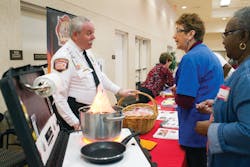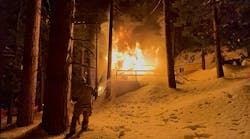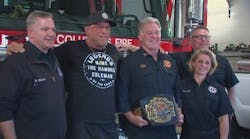What if President Obama woke up one morning and decided he wanted to come up with a plan that would reduce the damage and suffering fires cause in the United States? To devise such a plan, he might invite all the best minds in the fire service to Washington with the intention that the group would develop such a plan. What do you think the plan might consist of?
Well, actually, it has already been done. From May 6 to 8, 1947, President Harry Truman called together the “National Conference on Fire Prevention.” The three-day conference was held in Washington. He appointed Major General Philip B. Fleming, administrator of the Federal Works Agency (FWA), to serve as general chairman of the conference.
Nearly 2,000 of the nation’s finest leaders from the fire service, business, government, military and higher education attended the conference. President Truman told the group, “I can think of no more fitting memorial to those who died needlessly this year in the La Salle Hotel fire in Chicago, the appalling disaster at the Winecoff Hotel in Atlanta and the more recent New York tenement holocaust than that we should dedicate ourselves anew to ceaseless war upon the fire menace.” (Truman was referring to three tragedies that occurred in 1946: the Winecoff Hotel fire that killed 119 people; the La Salle Hotel fire that killed 61 people, many of them children; and an incident in New York City in which a burning abandoned icehouse collapsed onto an apartment building, killing 37 people, including a firefighter.)
Prevention a priority
Several committees were formed to work on various areas, including fire prevention education, law enforcement, building construction, firefighting, organized public support and research. When the plan was complete, it came up with the conclusion that it was best to prevent fires before they happen. This could be done in three areas, which were called the “Three E’s.”
• Engineering – Design and build structures that are safe from fire. Use the best building practices to resist fire or prevent great loss from fire.
• Enforcement – Enforce fire codes. While buildings are being designed and built, ensure that the work is done within required fire codes. Once construction is completed, fire and life safety codes should be followed and enforced.
• Education – Teach people how to prevent fires and what to do in the event of a fire. Most people really do not know what to do in the event of a fire. Most think they do, but when you quiz them on it, you will be amazed on how many do not.
If all departments followed this plan, there is a good chance fires would be dramatically reduced. But most people do not know of the plan or ever heard of it. It has not been mentioned in major fire publications for many years. In fact, the report was practically unheard of until 1996, when Fire Protection Engineer Azarang (Ozzie) Mirkhah, P.E., EFO, of Las Vegas Fire & Rescue found the report while working on a research project at the National Fire Academy and made people aware of it.
In most cases, fire prevention receives the least amount of attention and certainly the least amount of the department’s operating budget. Of the “Three E’s,” education usually gets the least amount. Every age group should receive fire and life safety education, as each group has its own particular needs. Small children do not know what to do when there is a fire or understand why we do things like have fire drills. Drills reinforce “conditioned reflexes” that is practiced monthly in school, but most fire deaths occur in the home. How many times do children practice or know what to do in the home?
Adults are the ones who take care of the children and are responsible for them. But many times, the children know more of what to do in the event of a fire because of what they learned in school. Adults should receive the highest amount of fire and life safety education both for home and at work.
Senior citizens have diminished capabilities and need to receive training on how to evacuate properly and how to prevent fires. There are still some senior citizens out there who do not know what a smoke alarm is or how it operates. About 800 senior citizens die in fires every year in the U.S.
A few weeks ago, I was a speaker at a Senior Safety Fair in East Las Vegas sponsored by the SALT (Seniors And Law Enforcement Together) Council. I reminded the crowd about the leading causes of fire with seniors, cooking, candles, careless smoking, smoking and medical oxygen. I cautioned them that they should not do any firefighting, even if they have a fire extinguisher. In fact, many seniors do not know how to use one and they should use the time to escape because many seniors have mobility issues.
Resources available
There are many programs and organizations that can help your department to develop or reinforce “The Three E’s” in your department. The National Fire Protection Association (NFPA), International Association of Fire Chiefs (IAFC) and National Volunteer Fire Council (NVFC) have fire prevention program information that can help your organization.
The fire service benefits from fire prevention also. By not having fires, we decrease the chances of personnel being injured or killed. There will always be a need for the fire service because of malfunctions, breakdowns, accidents and natural disasters, but if we work at it, we can decrease the number of incidents that are preventable like cooking fires, careless smoking, combustibles too close to a heat source or children playing with matches.
A fire service leader from the past said, “An ounce of prevention is worth a pound of cure.” (Benjamin Franklin, fire chief, Union Fire Company, 1736).
More Coverage On Firehouse App
You can find more training information, statistics and photos about fire safety education by downloading the Firehouse Limited Tablet edition on Dec. 15. Search “Firehouse Magazine” in iTunes or Google play and download the exclusive content for your iPad, Samsung Galaxy Tab, Motorola Zoom and Nexus Android devices.






